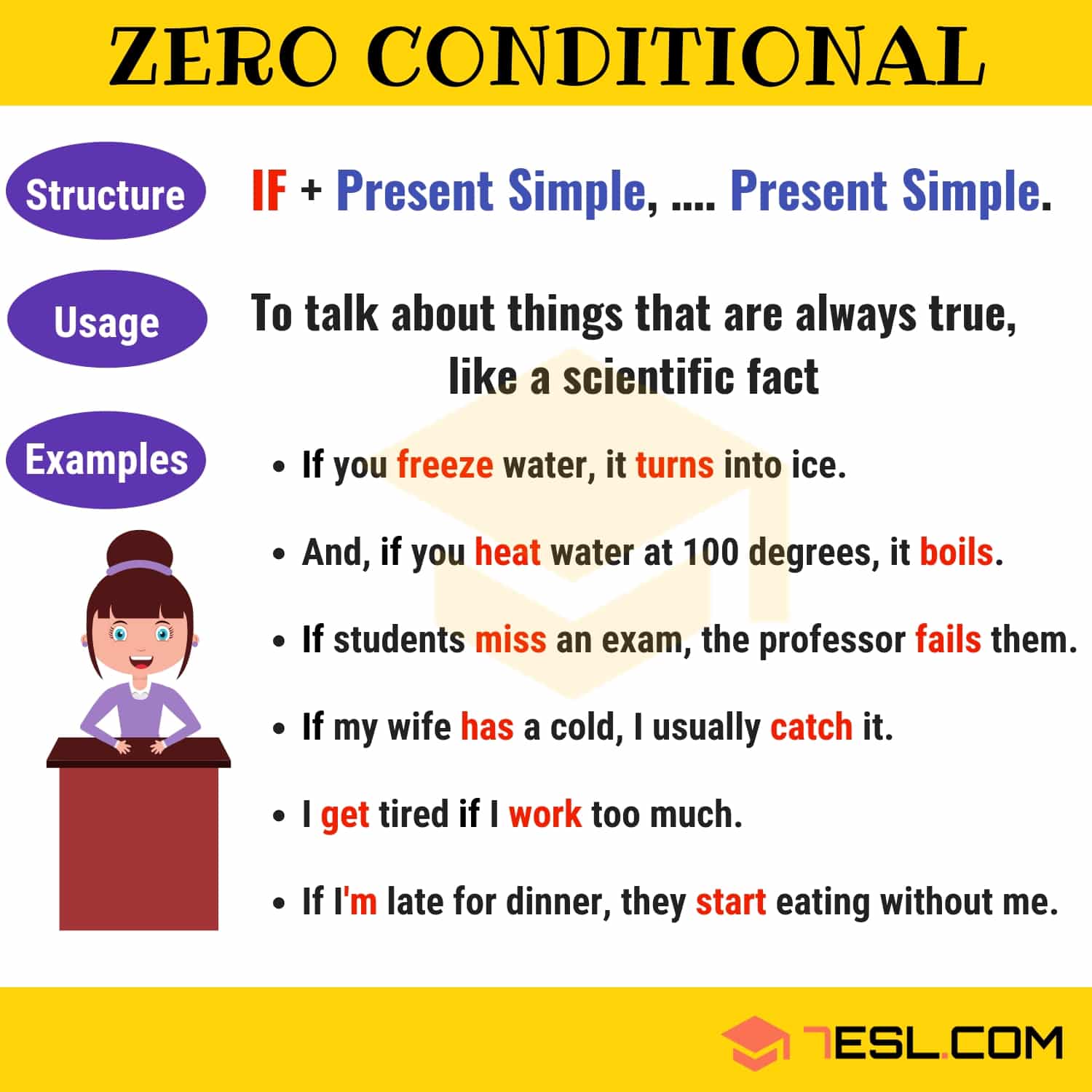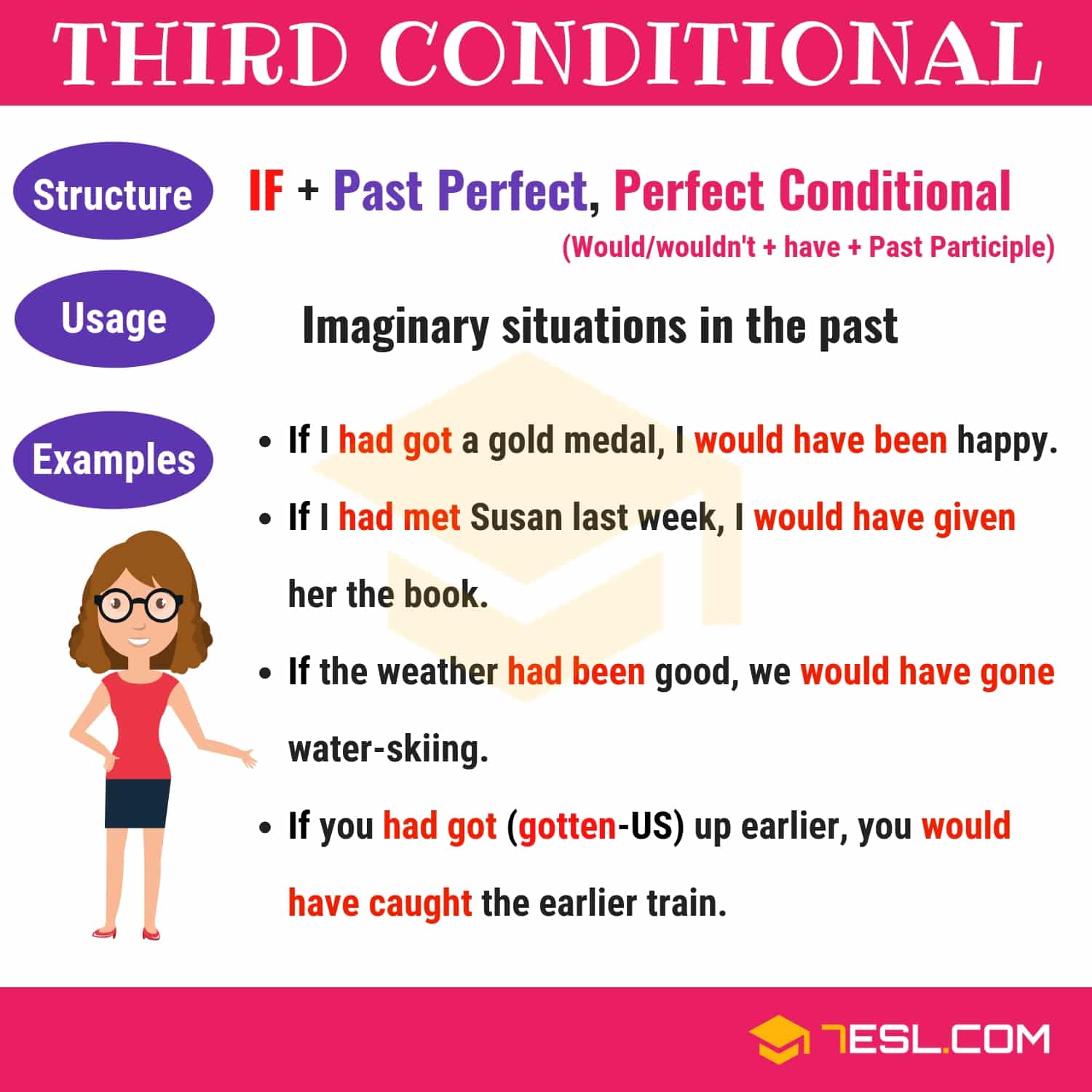Conditionals: 04 Types of Conditional Sentences
Conditional Sentences! Conditionals are sentences with two clauses, an “if” clause and a main clause, that are closely related. Generally, conditional sentences are often divided into different types.
Types of Conditionals in English
Zero Conditional
(Present Real Conditional)
In general, “zero conditional” refers to conditional sentences that express a factual implication, rather than describing a hypothetical situation or potential future circumstance. The grammar term is used particularly when both clauses are in the present tense, however such sentences can be formulated with a variety of tenses/moods, as appropriate to the situation.
How to use: We use the zero conditional to talk about things that are always true, like a scientific fact.
For example
- If you mix blue and red, you get purple.
- If it rains, the grass gets wet.
- If I go to bed early, I always get up very early.
- If you want to come, call me before 5:00.
- If I make a silly mistake, I laugh.
Conditionals: 04 Types of Conditional Sentences – Image 1

First Conditional
(Present or Future Real Conditional)
“First conditional” refers to a pattern used in predictive conditional sentences, i.e. those that concern consequences of a probable future event. In the basic first conditional pattern, the condition is expressed using the present tense. In some common fixed expressions or in old-fashioned or excessively formal, the present subjunctive is occasionally found. The consequence using the future construction with “will” (or “shall”).
How to use: We use the first conditional when we talk about possibilities in the present or in the future.
For example
- If need be, we’ll rent a car.
- If I find her address, I’ll send her an invitation.
- Elaine will buy the drinks if somebody helps her carry the bottles.

Second Conditional
(Present Unreal Conditional)
It should be noted that the “second conditional” refers to a pattern used to describe hypothetical, typically counterfactual situations with a present or future time frame (for past time frames the third conditional is used). And, in the normal form of the second conditional, the condition clause is in the past tense (although it does not have past meaning. The consequence is expressed using the conditional construction with the auxiliary “would”.
How to use: The second conditional is used to talk about Imaginary situations in the present or future.
For example
- If he had more time, he would learn karate.
- She could win the prize if she practiced hard.

Third Conditional
(Past Unreal Conditional)
Generally, “third conditional” is a pattern used to refer to hypothetical situations in a past time frame, generally counterfactual (or at least presented as counterfactual). Here the condition clause is in the past perfect, and the consequence is expressed using the conditional perfect.
How to use: We use the third conditional when we talk about Imagine situations in the past.
For example
- If she had studied hard last week, she could have passed the exam.
- I would have written you a postcard if I had had your address.
Conditionals: 04 Types of Conditional Sentences – Image 4

Mixed Conditionals
It should be noted that “mixed conditional” usually refers to a mixture of the second and third conditionals (the counterfactual patterns). Here either the condition or the consequence, but not both, has a past time reference.
Mixed 1 Conditional
(Present result of a past condition)
When the condition refers to the past, but the consequence to the present, the condition clause is in the past perfect (as with the third conditional), while the main clause is in the conditional mood as in the second conditional (i.e. simple conditional or conditional progressive, but not conditional perfect).
How to use: Present result of a past condition.
For example
- If she hadn’t stayed up late last night, she wouldn’t be so tired now.
- If he had worked harder at school, he would be a student now.
Mixed 2 Conditional
(Past result of a present or continuing condition)
When the consequence refers to the past, but the condition is not expressed as being limited to the past, the condition clause is expressed as in the second conditional (past, but not past perfect), while the main clause is in the conditional perfect as in the third conditional.
How to use: Past result of a present or continuing condition.
For example
- If I were you, I would have learned English earlier.
Conditionals: 04 Types of Conditionals – Image 5

How to Use Unless in English
Unless means if not. We use unless in conditional sentences instead of if not.
- Unless is similar in meaning to if not and can be used instead of if not in certain types of conditional sentences. Like if, unless is followed by a present tense, a past tense, or a past perfect tense.
- We cannot use unless in questions.
- We don’t use will or would in the clause after unless.
04 Types of Conditionals – Image 6

How to Use Wish in English
When we want to express a wish/desire in English for a situation to be different to what it actually is then it is very common to use the verb “to wish”.
How to Use Wish in English.
- Wish + Past Simple
- Wish + Past Continuous
- Wish + Past Perfect
- Wish + Would
- Wish + To Infinitive
04 Types of Conditionals – Image 7

Conditional Sentences in One Table
04 Types of Conditionals – Image 8




